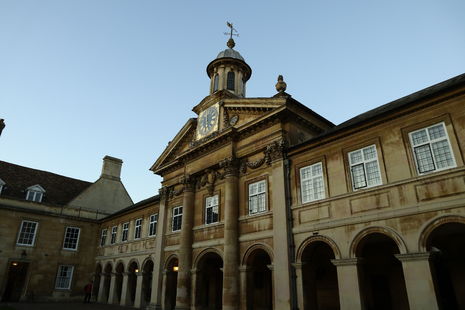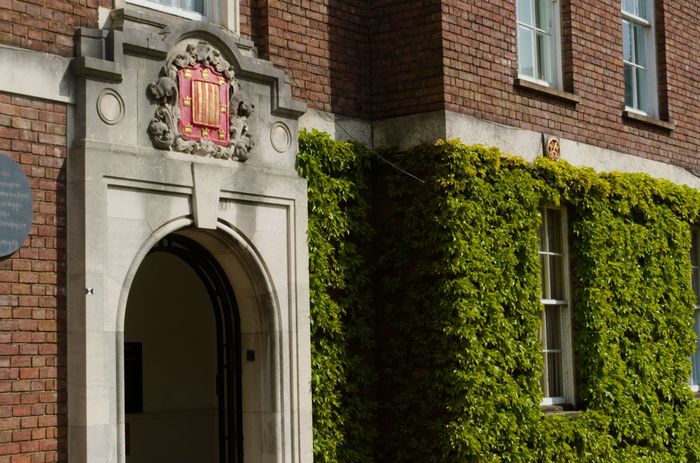How colleges shape the way we see the world
Luca Chandler argues that we must reject the tribalism that the college system promotes

Walk into any college bar on a Friday night, and you’ll hear the same kinds of conversations. The obligatory grumbling about work, gossip about who got with whom at Wednesday Revs, and, without fail, some dig at a rival college. We laugh, we roll our eyes, but deep down, we know these aren’t just jokes. The college system, for all its charm, does something strange to the way we think. It doesn’t just give us a place to live, it shapes how we see each other, how we form friendships, and maybe even how we understand society itself.
One of the first things you learn in Cambridge is that your college means something. It’s not just an address; it’s an identity. Before you even arrive, you hear the stereotypes: Trinity is for the poshos, King’s is for the artsy lefties, etc. You probably didn’t choose your friends based on their college, but somewhere along the way these labels started to mean something.
“There is no singular ‘Cambridge old boys’ network’”
This is classic in-grouping. We instinctively sort people into categories: us (my college) and them (everyone else). This is fine when it’s just jokey, but at its worst, it fosters a kind of low-stakes tribalism. How often do we dismiss someone just a little because of what college they’re from? Or assume we know something about them before they even speak? The Cambridge bubble amplifies this effect. Unlike most universities, where everyone is just part of the institution, we operate in micro-communities that subtly nudge us into seeing the world in divided terms.
In most of life, this kind of ‘othering’ is reserved for big, obvious rivalries. Outside of university, you might passionately hate Tottenham fans (which we do, of course) or have strong opinions about the north-south divide, but in daily life, these divisions rarely affect your friendships. At Cambridge, however, the lines feel sharper. Colleges don’t just represent different places to live; they act as social filters. From JCR elections to May Ball ticket allocations, they reinforce the idea that our primary social group is our college.
The effects of this can linger beyond our time here. When we leave, do we continue to see the world in these neat little categories? Do we unconsciously apply the same logic to workplaces, cities, and professions? It’s not hard to imagine that the same instinct which makes us instinctively prefer our own college might extend to our social and professional circles later on.
“One of the first things you learn in Cambridge is that your college means something”
Cambridge is also competitive. The college system pits us against each other in a way that can be both exhilarating and exhausting. We don’t just compete in rowing or University Challenge; we compare supervision structures, formals, libraries. Everything is a ranking. Even our social lives fall into this bizarre hierarchy, with some colleges being ‘cooler’ or ‘better’. The reality, of course, is that no one outside of Cambridge cares whether your college won Cuppers or whether its buttery serves legendary chips. But when you’re here, it’s hard to see past it.
That said, there’s an argument to be made that the college system actually prevents a larger, more insidious form of tribalism. If Cambridge functioned as one unified entity, would that create a stronger, more exclusionary elitism? Would we all be more likely to fall into the ‘we went to Cambridge’ club, projecting our collective privilege onto the world with greater force?
The college system fractures that identity. We don’t leave here thinking I went to Cambridge in the same way a Bristol grad might. We leave thinking I went to Emma or Catz or Fitz. That might not seem like a big difference, but it could be. Instead of forming a monolithic elite, people end up with less widespread affiliations. There is no singular ‘Cambridge old boys’ network’ in the same way as other institutions. The fragmentation of our identity might actually make us less insular in the long run.
The Cambridge college system instils a habit of seeing groups as distinct, of defining ourselves in relation to others. It’s a structure that, while fostering belonging, also makes divisions feel natural, even inevitable. In a world already filled with division, it’s worth asking whether Cambridge nurtures a mindset that reinforces these separations rather than breaking them down.
And yet, for all its tribalism, the college system also keeps Cambridge from being a singular, imposing force in the outside world. It disperses alumni into smaller, less intimidating pockets, possibly making its exclusivity a little less suffocating.
Perhaps, then, the most important thing is not to take Cambridge’s artificial borders too seriously. Because at the end of the day, whether we like it or not, the rest of the world won’t care what college we went to. And neither should we.
 News / Colleges charge different rents for the same Castle Street accommodation2 March 2026
News / Colleges charge different rents for the same Castle Street accommodation2 March 2026 News / King’s hosts open iftar for Ramadan3 March 2026
News / King’s hosts open iftar for Ramadan3 March 2026 Theatre / Lunatics and leisure centres 4 March 2026
Theatre / Lunatics and leisure centres 4 March 2026 News / Angela Merkel among Cambridge honorary degree nominees27 February 2026
News / Angela Merkel among Cambridge honorary degree nominees27 February 2026 News / News in Brief: waterworks, wine woes, and workplace wins 1 March 2026
News / News in Brief: waterworks, wine woes, and workplace wins 1 March 2026








